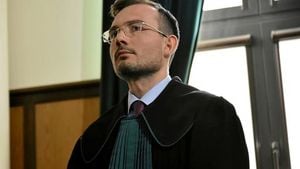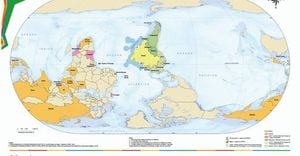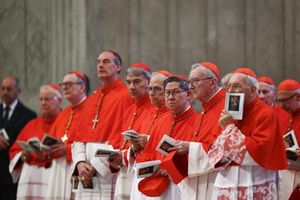In a significant twist in ongoing negotiations regarding Ukraine's territorial integrity, Russian President Vladimir Putin has made a bold proposition. He is calling on U.S. President Donald Trump to officially recognize Crimea, Donetsk, Lugansk, Zaporojie, and Herson as territories of Russia. This unexpected demand was detailed in a report by the Russian publication Kommersant on March 19, 2025, and has raised eyebrows given the ongoing conflict and geopolitical tensions.
According to the report, this request for acknowledgment is contingent upon Russia's commitment to refrain from claiming Odesa and potentially other Ukrainian regions, which could extend all the way to the Romanian border and the mouth of the Danube River. Only the province of Lugansk is currently under almost complete Russian control, while Ukraine retains a foothold in the other provinces, controlling between one-fifth and one-third of their territories. The Ukrainian army notably holds more ground in Herson, especially following a Russian withdrawal from the northern part of the province in November 2022.
The context of this proposal is essential, particularly considering that Ukraine had launched a significant counteroffensive during the summer of 2023, which ultimately failed to secure notable territorial gains. After recent discussions between Putin and Trump—detailed on March 18—Kremlin spokesman Dmitri Peskov stated that the issue of territorial recognition was not directly addressed during their conversation. Instead, the two leaders agreed to a partial ceasefire lasting 30 days, aiming to stop attacks on energy infrastructure while dialogue for a more comprehensive peace agreement continues.
This pledge from Putin comes as Russia insists on recognizing the annexed land as part of its territory, seeking to exclude Ukraine from NATO and push for a new European security framework. The conditions set by the Kremlin add layers of complexity to the already tangled state of affairs, highlighting both local and international ramifications that could follow.
Peskov's remarks also indicated a desire for the peace dialogue to address “the fundamental causes of the crisis” and underline what he termed Russia’s “legitimate security interests.” In light of this, Ukraine’s President Volodimir Zelenski has responded with caution. He has labeled any discussions that might lead to the normalization of illegal territorial claims as a “red line” that Ukraine cannot cross.
Further complicating the matter, during a private meeting with the Union of Industrialists and Entrepreneurs of Russia (RSPP), Putin remarked that if the regions of Crimea, Donetsk, Luhansk, Zaporojie, and Herson are recognized as Russian, then Russia would not claim Odesa. This supposed understanding, however, is precarious and leaves much to be determined in ongoing negotiations.
In detailing these discussions, Andrei Kolesnikov of Kommersant noted that Putin expressed during the closed-door meeting that Ukraine could have acted more decisively to secure peace with less bloodshed. He lamented that Ukraine appeared unwilling to consider recognizing Crimea as Russian territory, which Putin views as a vital issue for future negotiations.
Meanwhile, concerns have surfaced within Ukraine regarding the potential willingness of the Trump administration to consider these proposals. As reported by The New York Times, there is mounting apprehension that Trump might agree to a territorial compromise that includes handing over Odesa to Russia. The U.S. administration's position remains critical, especially as speculations circulate about Trump's possible support for recognizing Crimea as Russian territory under a future agreement.
The ramifications of these negotiations are profound, as they grapple with not only the immediate territorial disputes but also the broader implications for regional security and balance of power. The potential acknowledgment of Russian claims could lead to significant shifts in international policy and agreements, which many stakeholders are continuously monitoring.
As tensions remain high and international responses vary, the world watches closely how these negotiations evolve and whether they can find a pathway towards lasting peace or whether they will spiral into further conflict.
In the shadow of these renewed dialogues, it becomes evident that the stakes are higher than ever, with the territorial integrity of Ukraine hanging in the balance against the backdrop of global politics.




